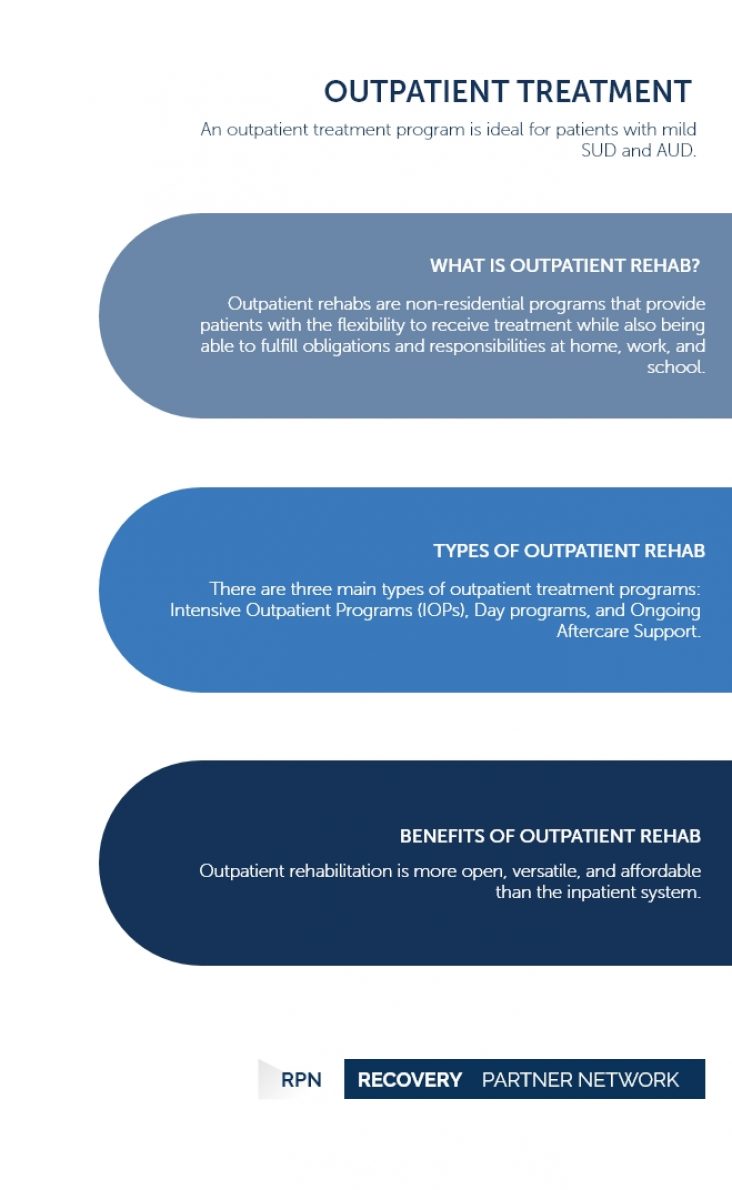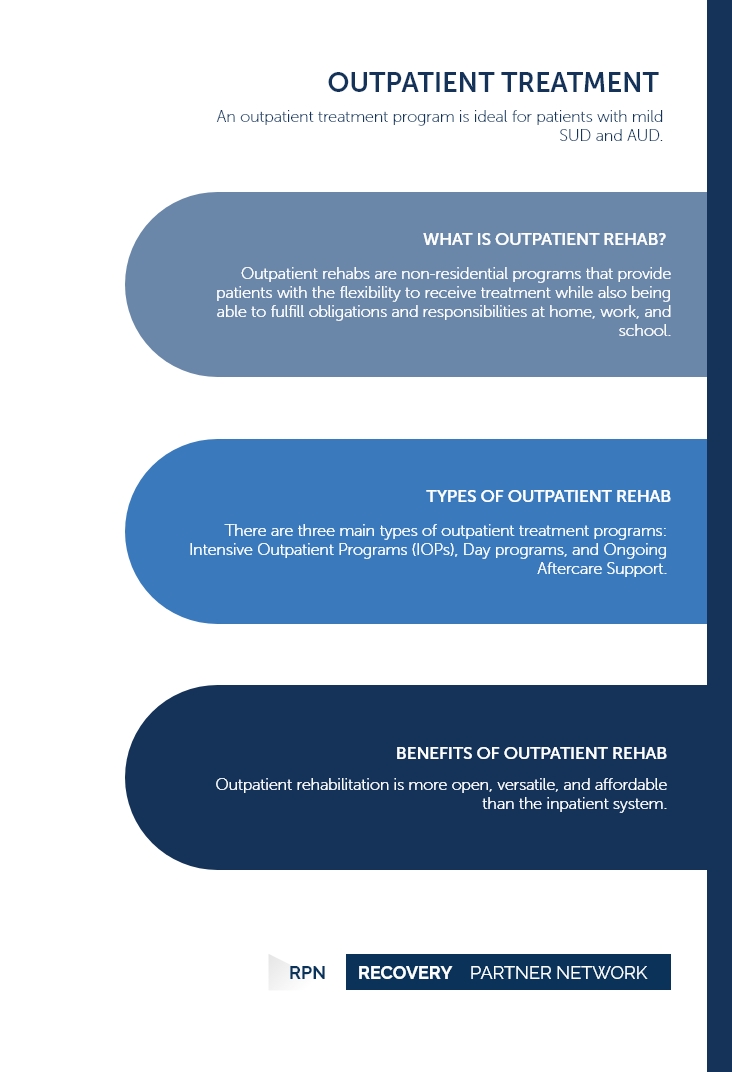An outpatient treatment program is ideal for patients with mild SUD and AUD.
Outpatient clinic
Outpatient treatment | Table of Contents
Outpatient Addiction Treatment
Rehabilitation centers consist of two main categories, such as inpatient rehabilitation centers and outpatient rehabilitation centers. Severe addictions to drugs, such as heroin or oxycodone, are usually better managed at an inpatient residential facility to help manage withdrawal and provide around the clock care. However, early-stages of addiction or mild substance abuse are ideally addressed through an outpatient recovery facility.
FAQ
Outpatient treatment provides addiction treatment without the need for hospitalization or overnight stays. Outpatient treatment centers provide a less restrictive environment for patients who suffer from mild forms of addiction or for patients who have completed inpatient treatment.
Patients who have already completed inpatient treatment are advised to seek further treatment at outpatient care to help them gradually reintegrate into the outside world. This program helps reduce the risk of relapses.
What is Outpatient Rehab?
Outpatient centers are non-residential programs that provide few hours of treatment, hence providing patients with the flexibility to receive treatment while also being able to fulfill obligations and responsibilities at home, work, and school. Patients who complete treatment at an inpatient rehab can also receive further treatment at an outpatient rehab.
The outpatient recovery service provides drug and alcohol treatment sessions during different times of the week. This arrangement allows patients to receive the treatment they require and return back to their daily lives. Unlike the structured environment at an inpatient treatment center, outpatient facilities take on a more laid back approach. Treatments at an outpatient facility may last from 30 days to several years, depending on the patient’s needs and requirements.
Both inpatient and outpatient facilities treat almost all forms of drug addiction. Both use similar therapy techniques like cognitive behavioral therapy and contingency management. However, outpatient treatment programs provide patients with the opportunity to learn coping skills and connect with others in a safe environment while also being able to immediately put those skills into practice in the outside world.
Types of Outpatient Rehab
Each outpatient rehabilitation program varies in the level of care and services provided. There are three types of outpatient treatment programs available such as:
Intensive outpatient programs create a treatment plan with specified, measurable milestones to indicate improvement. As these milestones are met, the time commitment expected each week would decrease. An IOP may require multiple sessions for a few hours per week for counseling sessions, group therapy, relapse prevention preparation, and participation in a 12-step or similar recovery support group.
Outpatient day services provide the highest level of care and structure offered in an outpatient framework. In a day program, patients are committed to attending 5-7 days a week at an outpatient facility for many hours per day. During this phase, patients will engage in ongoing treatment, community counseling, biofeedback, and other adjunct therapy, such as painting or music therapy.
Patients may head home after each session, either to their families or to a sober living home. Day programs require a substantial amount of time commitment, restricting the individual’s availability to work or go to school until the program is completed.
Support groups like Alcoholics Anonymous (AA) or Narcotics Anonymous (NA) are continuous support resources to help patients improve their dedication to sobriety. The groups are generally facilitated by a licensed therapist and operate on a weekly basis. Some support groups can be age-specific or gender-specific, while others may concentrate on a particular aspect of recovery.
Benefits of Outpatient Rehab
Outpatient rehabilitation is considered the ideal treatment alternative for mild to moderate addictions. These services are more open and versatile than the inpatient system.
Some of the main reasons for considering outpatient rehabilitation include:
Since patients remain at home through outpatient care, they are not required to bear the expense of living at an inpatient facility. This aspect makes outpatient care more affordable than inpatient.
Outpatient treatment services usually fit around a patient’s daily schedule. It provides patients with the flexibility to return home, work, or school after or before receiving the treatment they require.
Throughout outpatient treatment, family engagement and support are encouraged as they are vital in a patient’s journey to recovery.
FAQ
- What is the benefit of outpatient treatment programs?
- How long does outpatient programs last?
- What are the services provided at an outpatient treatment center?
The main benefit of outpatient treatment is the possibility to receive the treatment they require while also being able to return home to their families, work, or even school. Outpatient treatments are less costly, with minimum disruption to one’s daily life.
Treatment at an outpatient rehab may last 3-6 months or, in some cases, over a year.
Outpatient treatment consists of education on addiction, individual/group counseling, therapies, and education on relapse prevention techniques.
Outpatient Statistics
- Out of the vast majority of rehabs available in the US, 82.2 percent are outpatient rehab facilities.
- Ninety-nine percent of outpatient facilities provided assessment and pre-treatment services.
- Eighty-nine percent of outpatient programs provide drug testing services.
- Among the outpatient facilities found in the US, 57 percent provided at least one pharmacotherapy or medication for treatment.
Although patients are able to decide for themselves as to the type of treatment facility they wish to attend, it is best to follow the recommendation of your physician to increase your chance of a prolonged recovery.
Recovery Partner Network
We aim to educate and empower. If you feel our library of resources does not cover your specific need, reach out to us, and we would be happy to help.
STATISTICS
© Copyright 2025


